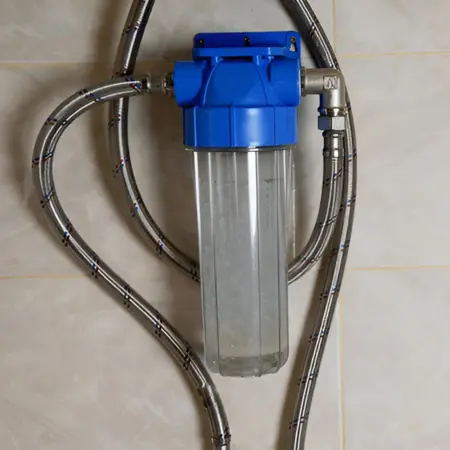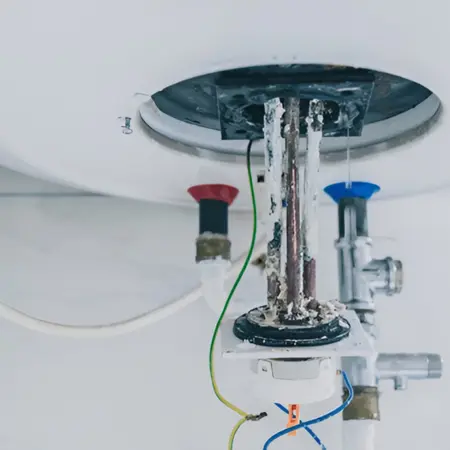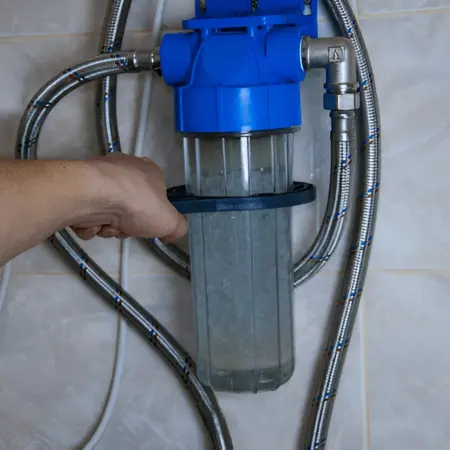Is your water softener not performing as it should?
Expert tips on repair and replacement can help you solve issues effectively.
With the right guidance, you can ensure your system runs smoothly and keeps your water soft and clean.
Key Takeaways
- Regular maintenance is essential for keeping your water softener running smoothly.
- Clean the tank with water and vinegar, then rinse before refilling.
- Inspect the drain line for twists or clogs and ensure it’s connected properly.
- Reset the softener by unplugging the reset button, then reprogram the settings.
- Check seals, O-rings, and valves for wear and replace them as needed.
- Call a professional for constant issues and complex repairs.
- Choose a new softener based on water hardness, household size, and type.
Expert Tips For Water Softener Repair
Here are some expert tips for water softener repair to help you solve common issues.
These simple steps can save you time and money while running your softener smoothly.
Remember, regular maintenance is key to keeping it running effectively.
Here are some DIY troubleshooting steps:
1. Check The Salt Level
- Open the brine (salt water) tank.
- Ensure there’s enough salt.
- If it’s low, add more.
2. Clean The Tank
- Turn off the softener.
- Remove any salt and water.
- Clean the tank with a mixture of water and vinegar.
- Rinse thoroughly before refilling.
3. Inspect The Drain Line
- Check for twists and clogs.
- Ensure it’s properly connected.
- Clear any blockages if necessary.

Here’s how to reset and reprogram the softener:
1. Locate The Control Panel
- Find the digital display or dial on your softener.
2. Reset The Unit
- Press the “Reset” button (if available).
- Unplug the unit for a few minutes, then plug it back in.
3. Reprogram Settings
- Set the time and hardness level.
- Follow the guide for specific programming instructions.
Here’s how to replace the worn-out parts:
1. Identify The Worn Parts
- Check seals, O-rings, and valves for wear and tear.
2. Turn Off Water Supply
- Shut off the water to the softener.
3. Replace The Parts
- Carefully remove the old parts.
- Install new seals or O-rings, ensuring a tight fit.
- Reattach valves if necessary.
When To Call A Professional Plumber
Consider calling a professional for help in these situations:
1. Persistent (Constant) Issues
If problems continue after DIY repairs.
2. Complex Repairs
For electrical or complex mechanical issues.
3. Safety Concerns
If you’re unsure about any steps.
4. Lack Of Time Or Tools
If you can’t spare time for repairs.
Professional Water Softener Repair And Replacement Services
Hiring a professional for water softener repair and replacement ensures the job is done right.
This gives you peace of mind and a properly functioning system.
Here’s why hiring an expert is important:
1. Proper Diagnosis
Experts can quickly identify the exact issue.
They have the tools and experience to fix it effectively.
2. Safe Installation
Professionals know how to install systems safely.
This prevents leaks and possible water damage.
3. Warranty Protection
Many manufacturers need professional installation for warranty coverage.
This ensures your investment is protected.
4. Time And Effort Saved
Hiring an expert frees you from the trouble of DIY repairs.
You can focus on other important tasks.
Contact us at OP Plumbing Hub for expert services.

Choosing The Right Water Softener For Replacement
Consider these factors when choosing the right water softener for your home.
A well-chosen system will provide soft water, improve your appliances, and enhance your quality of life.
Factors To Consider
Here are some factors to consider when selecting a new water softener:
1. Water Hardness Level
Test your water hardness using a test kit.
Knowing how hard your water is will help you choose the right system.
2. Water Usage
Consider how much water your household uses daily.
Larger families and homes with heavy water use may need a more powerful softener.
3. Type Of Softener
Here are three types of water softeners:
- Salt-Based Softener: Effective for hard water but requires salt.
- Salt-Free Softener: Good for reducing scale but may not remove hardness completely.
- Dual-Tank Systems: Offers continuous soft water, which is ideal for large households.
Matching Water Softener Size To Household Needs
Here are key points to consider when matching your water softener size to your household needs:
1. Calculate The Right Size
Determine the number of people in your home.
Multiply this number by daily water usage (typically 80-100 gallons per person).
Consider your water hardness level to find the right capacity (measured in grains).
2. Choose The Right Capacity
Softener capacities range from 20,000 to 100,000 grains or more.
A larger capacity means fewer regenerations and less maintenance.

Benefits Of Energy-Efficient Models
Here are the benefits of energy-efficient water softeners.
They save you money on bills and help the environment by using less water and salt.
1. Lower Operating Costs
Energy-efficient models use less electricity and water.
They can save you money on utility bills over time.
2. Environmental Friendly
Using less salt and water is better for the environment.
Many models are designed to cut waste.
3. Longer Lifespan
Energy-efficient systems often have better technology, leading to improved strength.
This means fewer replacements over the years.
Conclusion
This article discusses expert tips for water softener repair.
Professional water softener repair and replacement services have also been discussed.
Hiring a professional ensures your system works well and lasts longer.
Furthermore, choosing the right water softener and when to call a pro has also been discussed. Contact us at OP Plumbing Hub for high-quality services.
